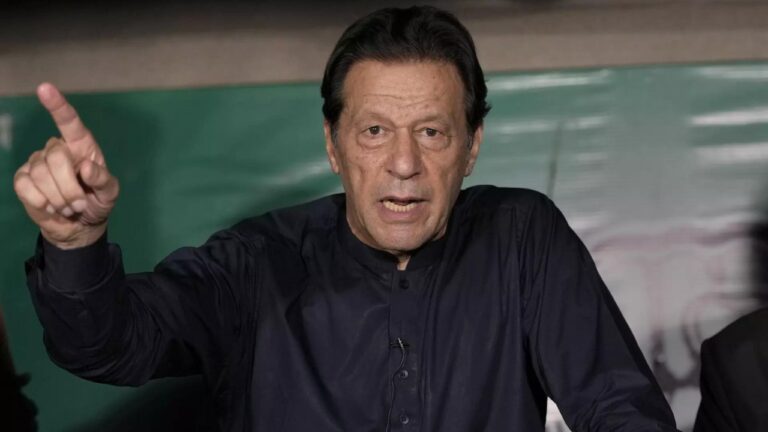ISLAMABAD: A dispute between Pakistan’s most popular politician and jailed former prime minister Imran Khan and the country’s highest political figure, Army Chief General Asim Munir, has intensified after Khan admitted to making anti-military comments likening the country’s current political situation to the fall of Dhaka in 1971.
The posts were uploaded by Imran’s social media team to his X account last week and included a video comparing the past and present military leadership and a statement urging people to study the Judicial Commission report on Pakistan’s partition. The uploaded posts also contained pictures of Pakistan’s current civilian and military leadership, which are alleged to have cost Imran’s Pakistan Tehreek-e-Insaf (PTI) support in the general elections in February this year.
“Every Pakistani should study the Hamoodur Rahman Committee report and know whether the real traitor is General Yahya Khan or Sheikh Mujibur Rahman,” Imran was quoted as saying.
The commission was investigating Pakistan’s political and military involvement in East Pakistan (now Bangladesh) between 1947 and 1971. The video referred to crimes allegedly committed by Pakistani troops during the East Pakistan civil war and alleged that former military dictator General Yahya was responsible.
The post sparked strong backlash, particularly from government officials who called it “alarming” and accused the PTI of stoking a narrative of “hatred and incitement” by comparing Imran to Mujib.
On Friday, Federal Investigation Agency (FIA) officials visited Imran in the prison where he is being held and questioned him about the case, but he refused to meet them without a lawyer. The FIA has served a notice on Imran in the case.
This was followed by a meeting of military commanders who vowed to defeat “digital terrorism” that seeks to discourage the people and stoke discord by spreading “blatant lies, fake news and propaganda.” “The people are fully aware of the ugly and hidden motives and plans of these evil forces,” General Munir reportedly told the military’s media wing.
Until recently, Imran’s PTI had tried to distance itself from the controversial posts but at his instructions it “took up” them. A meeting of PTI’s core committee was held on Friday. “The Hamoodur Rehman Committee report must be made public to avoid grave challenges like 1971, learn lessons from the past and inform the public about what actually happened in 1971,” PTI said in a statement after the meeting.
The statement then sought to compare 1970 with the current situation in Pakistan. “The most important aspect of the 1971 fiasco was the denial of a public mandate, which is still prevalent in Pakistan today,” PTI said.
The posts were uploaded by Imran’s social media team to his X account last week and included a video comparing the past and present military leadership and a statement urging people to study the Judicial Commission report on Pakistan’s partition. The uploaded posts also contained pictures of Pakistan’s current civilian and military leadership, which are alleged to have cost Imran’s Pakistan Tehreek-e-Insaf (PTI) support in the general elections in February this year.
“Every Pakistani should study the Hamoodur Rahman Committee report and know whether the real traitor is General Yahya Khan or Sheikh Mujibur Rahman,” Imran was quoted as saying.
The commission was investigating Pakistan’s political and military involvement in East Pakistan (now Bangladesh) between 1947 and 1971. The video referred to crimes allegedly committed by Pakistani troops during the East Pakistan civil war and alleged that former military dictator General Yahya was responsible.
The post sparked strong backlash, particularly from government officials who called it “alarming” and accused the PTI of stoking a narrative of “hatred and incitement” by comparing Imran to Mujib.
On Friday, Federal Investigation Agency (FIA) officials visited Imran in the prison where he is being held and questioned him about the case, but he refused to meet them without a lawyer. The FIA has served a notice on Imran in the case.
This was followed by a meeting of military commanders who vowed to defeat “digital terrorism” that seeks to discourage the people and stoke discord by spreading “blatant lies, fake news and propaganda.” “The people are fully aware of the ugly and hidden motives and plans of these evil forces,” General Munir reportedly told the military’s media wing.
Until recently, Imran’s PTI had tried to distance itself from the controversial posts but at his instructions it “took up” them. A meeting of PTI’s core committee was held on Friday. “The Hamoodur Rehman Committee report must be made public to avoid grave challenges like 1971, learn lessons from the past and inform the public about what actually happened in 1971,” PTI said in a statement after the meeting.
The statement then sought to compare 1970 with the current situation in Pakistan. “The most important aspect of the 1971 fiasco was the denial of a public mandate, which is still prevalent in Pakistan today,” PTI said.

